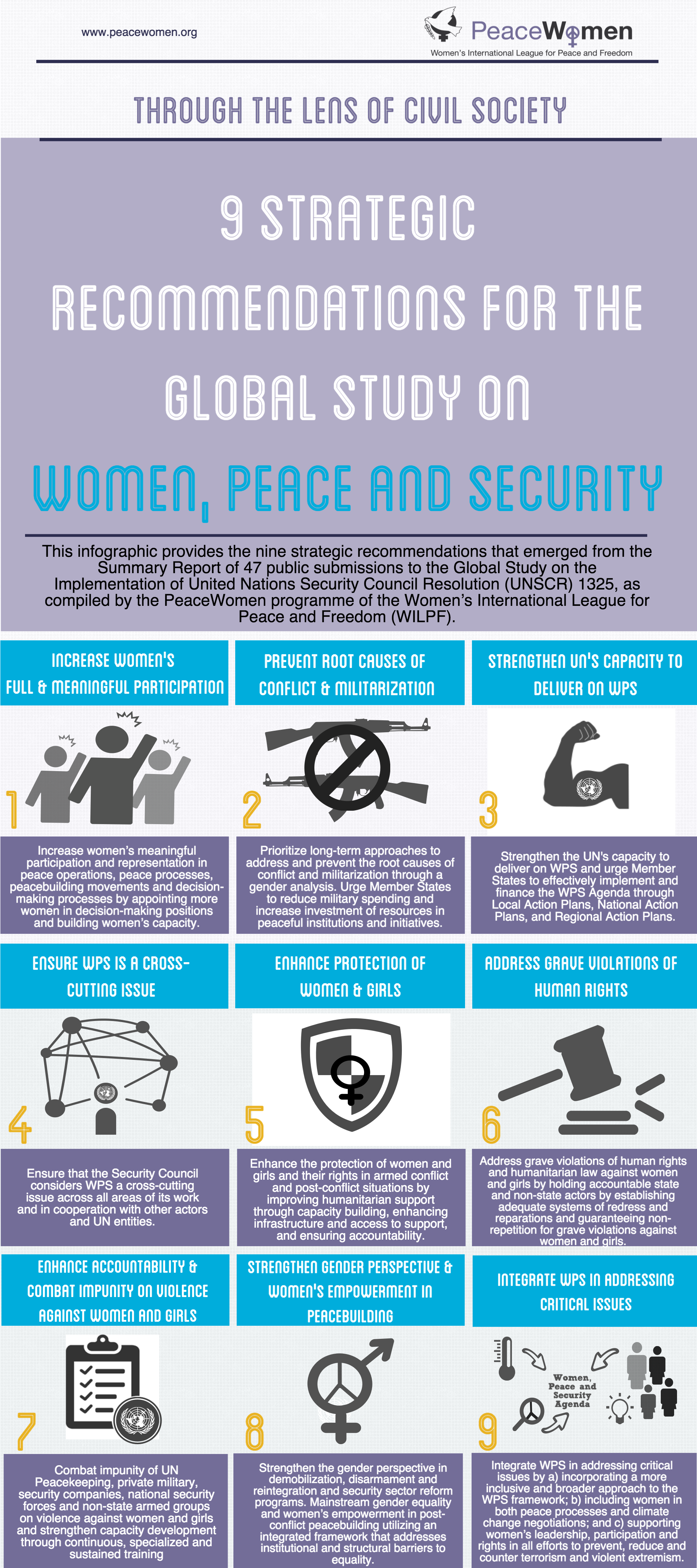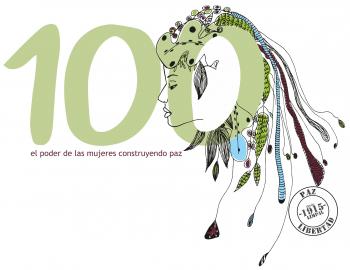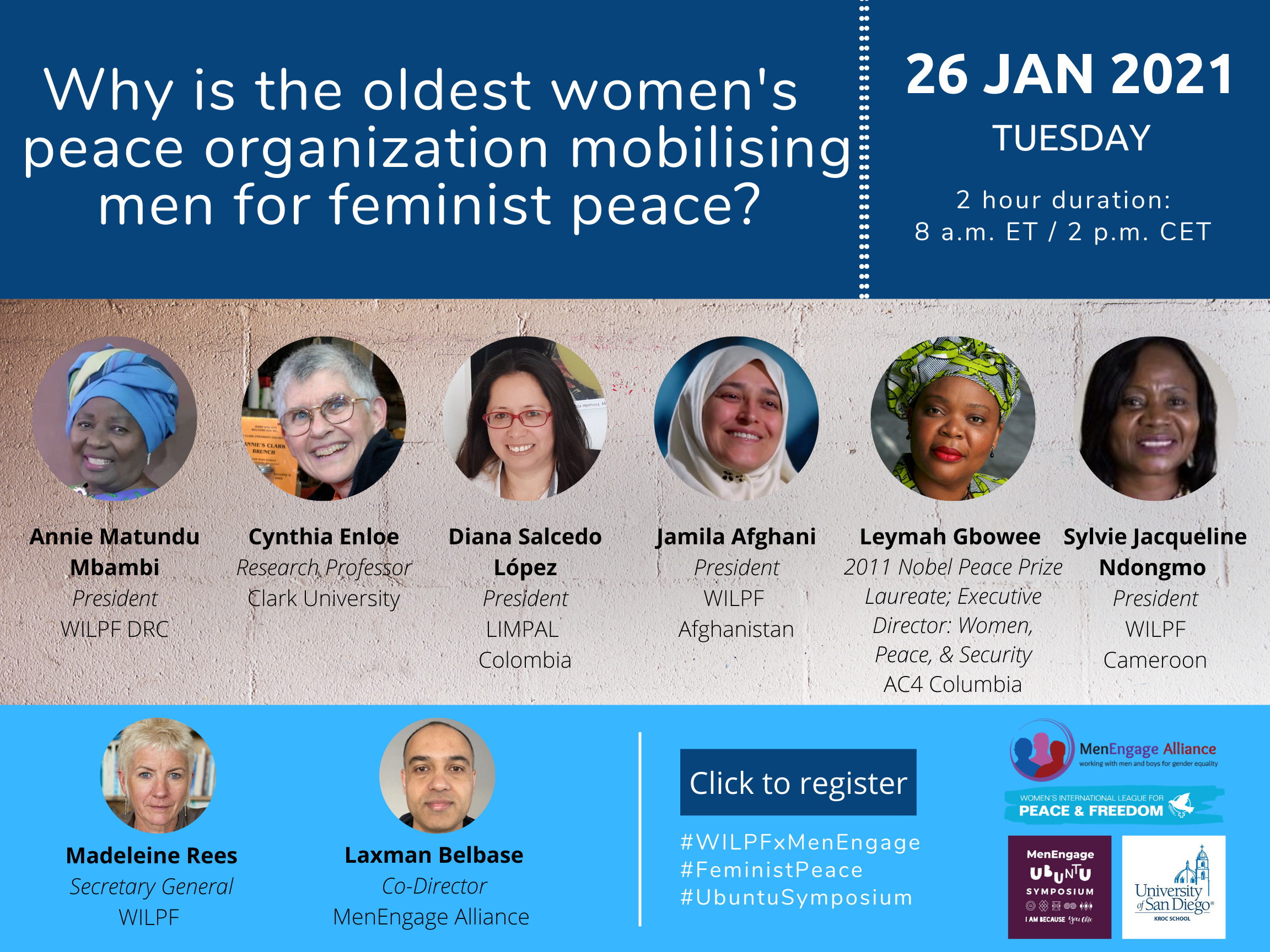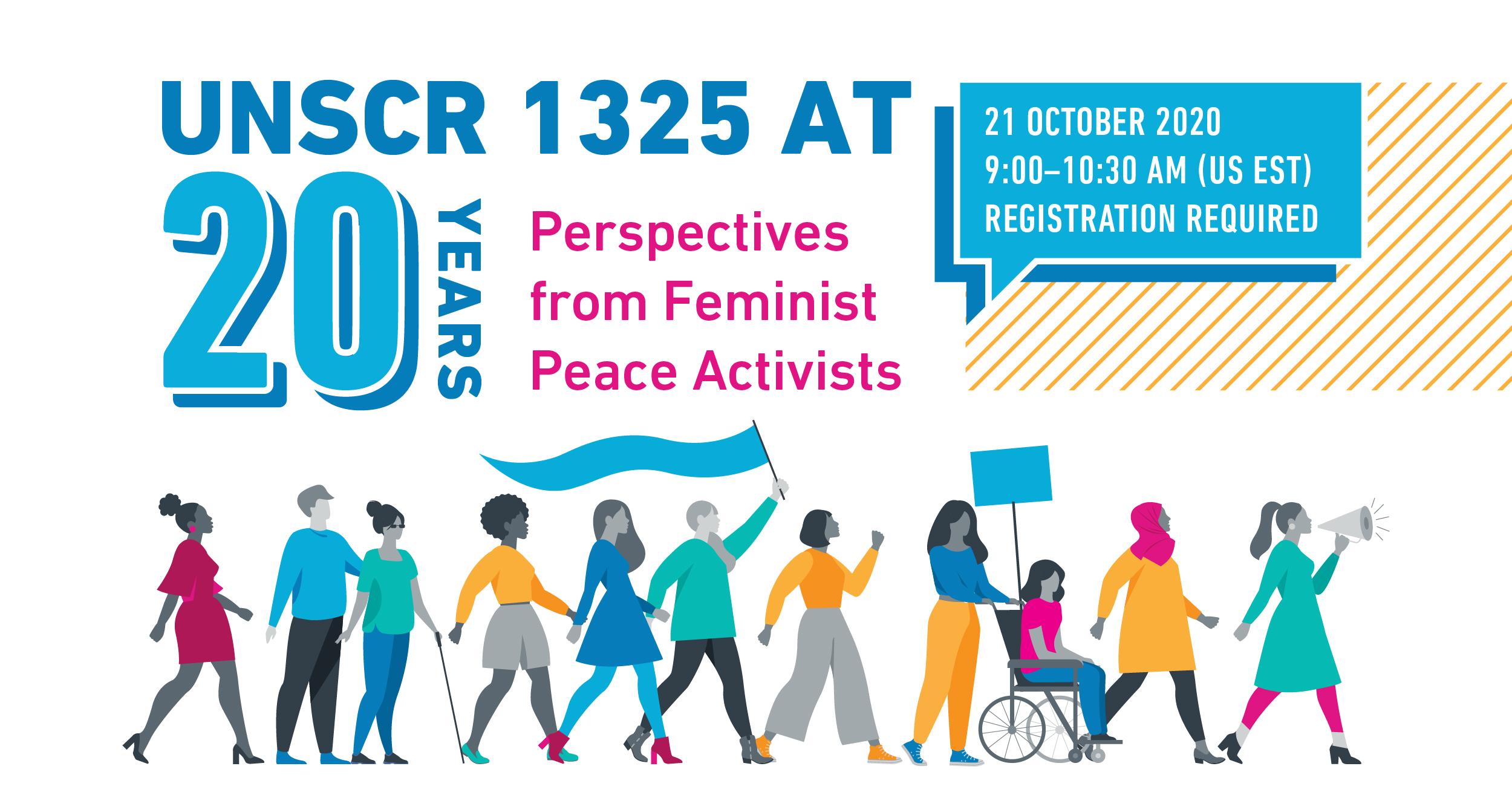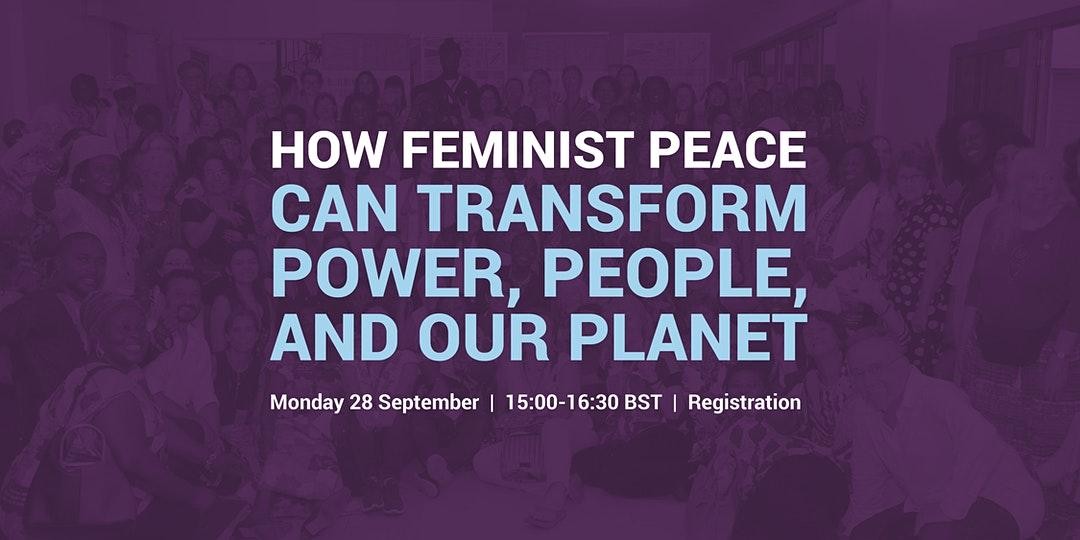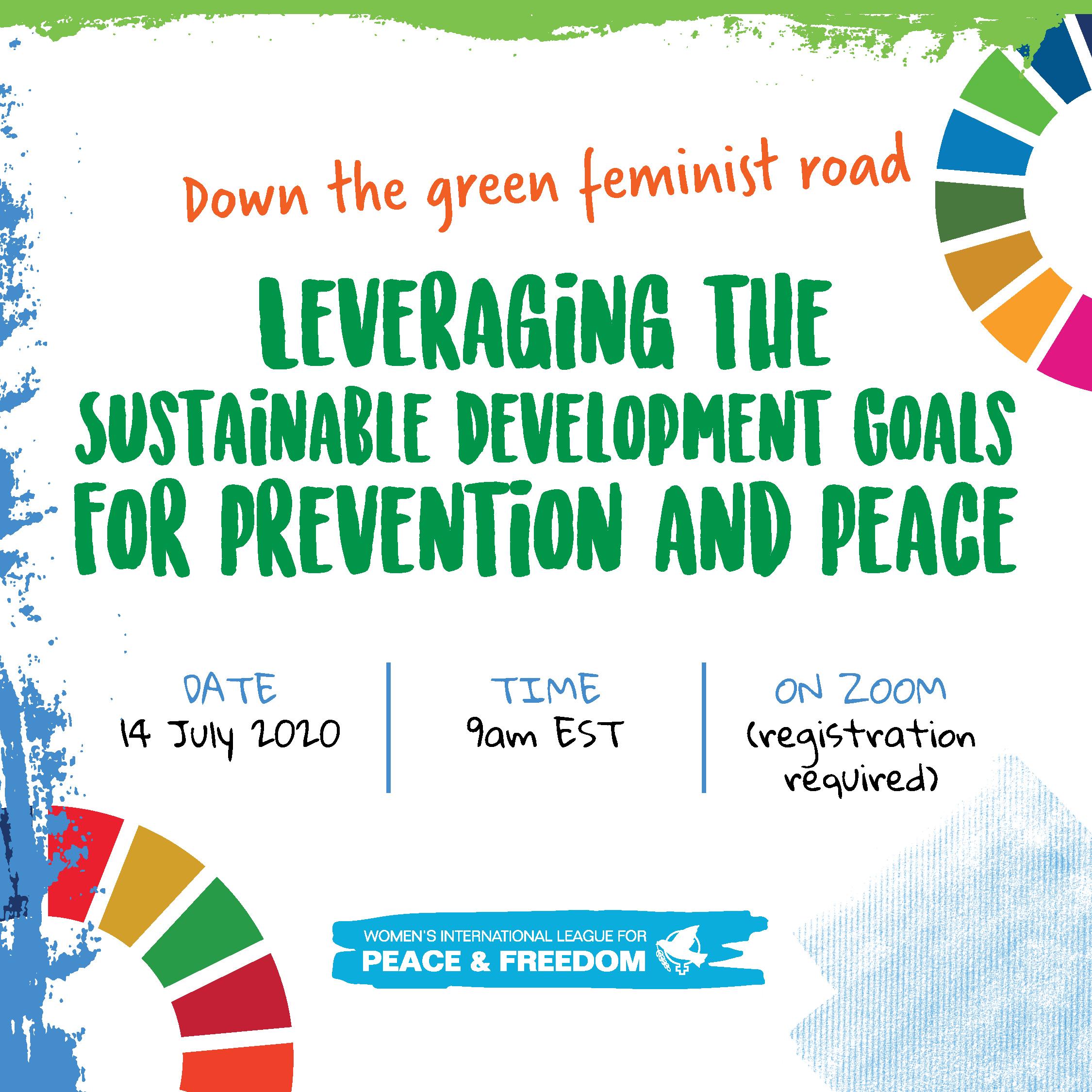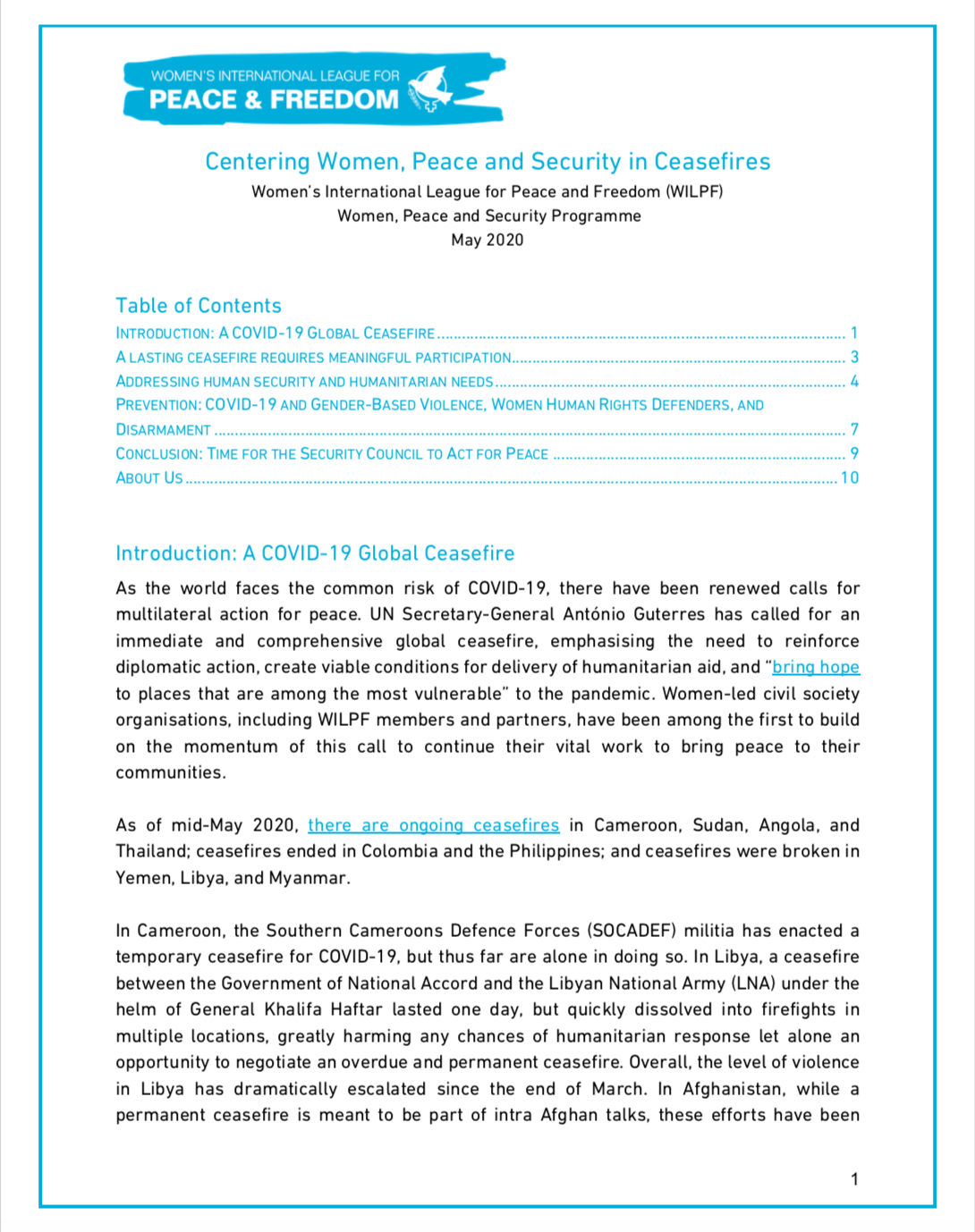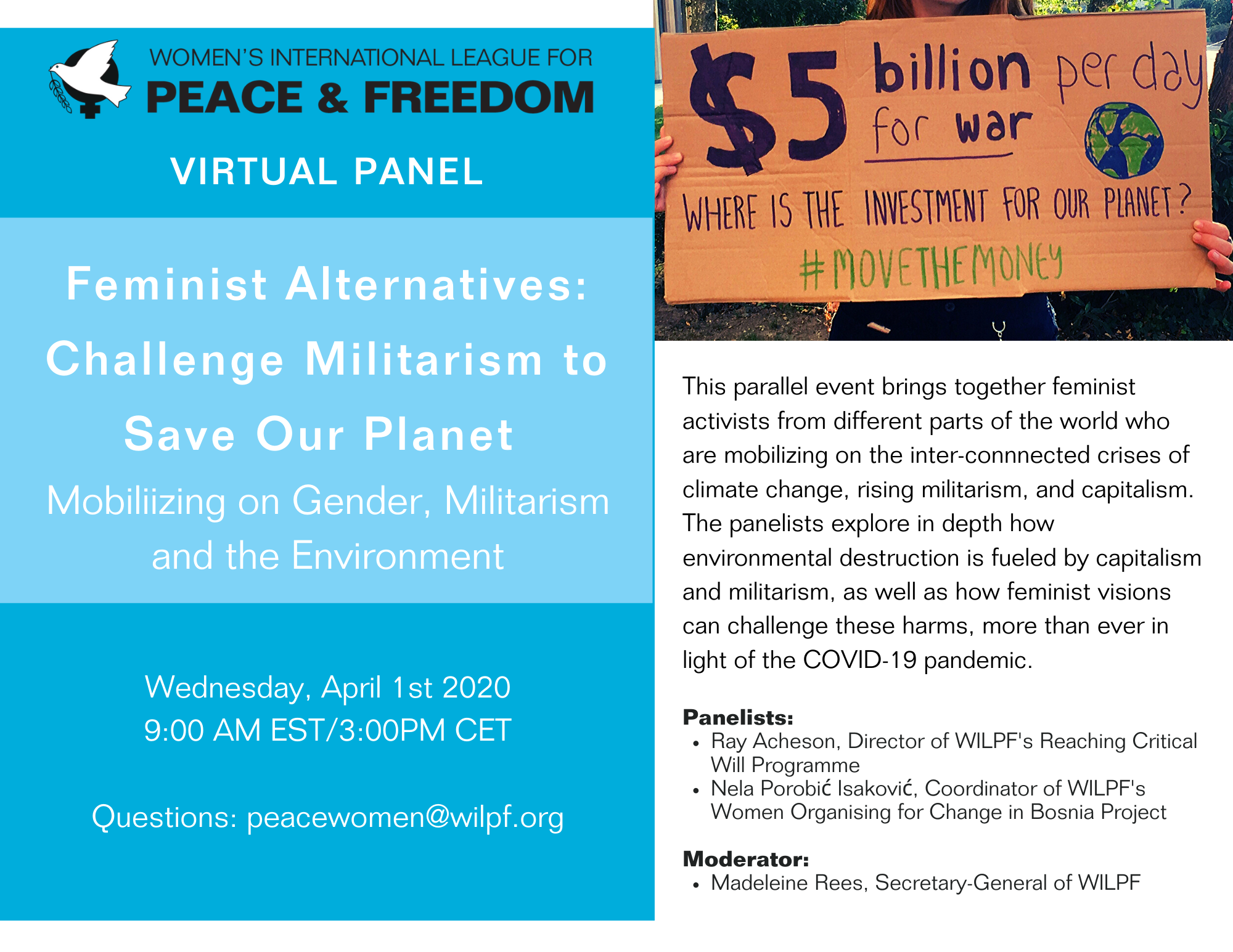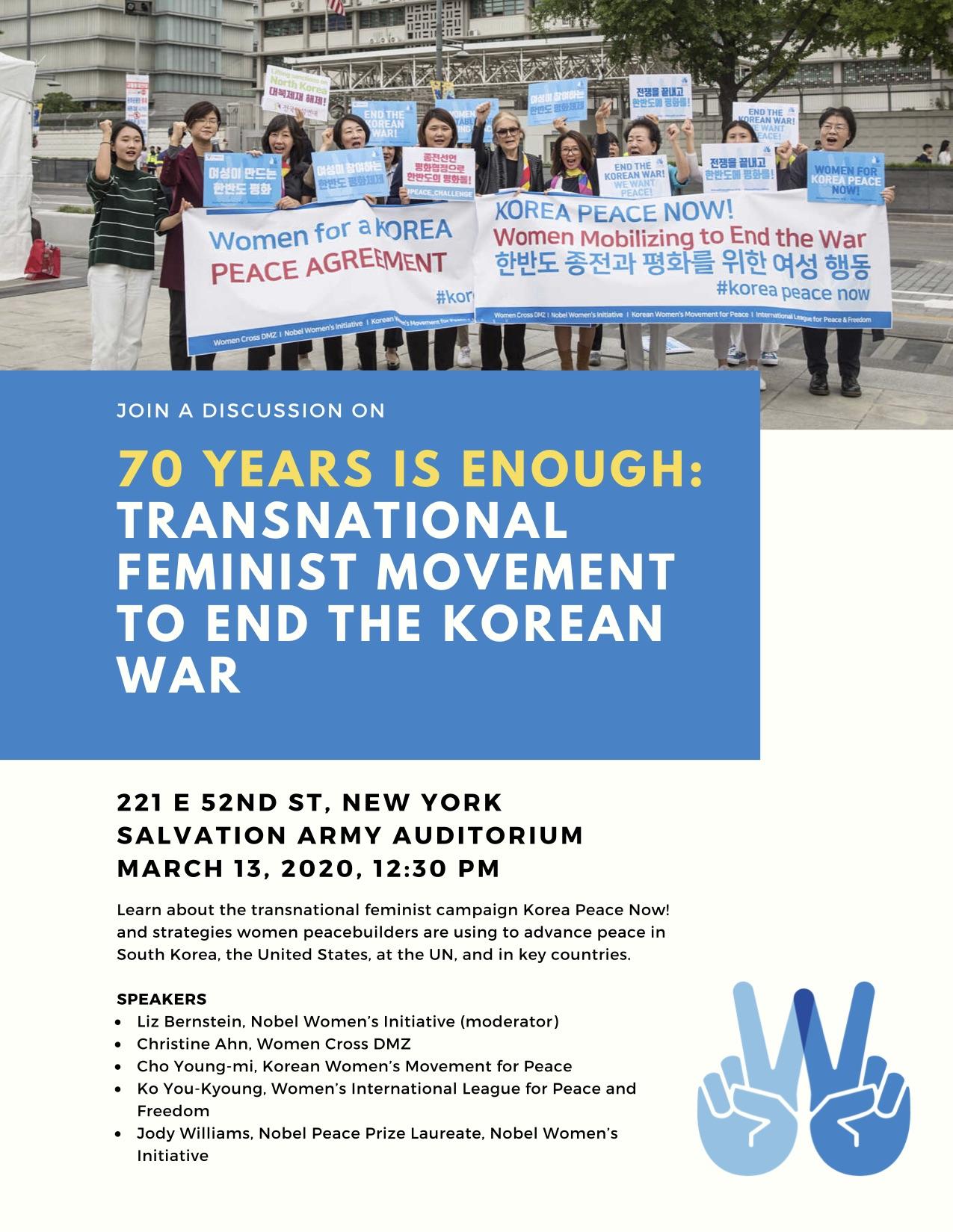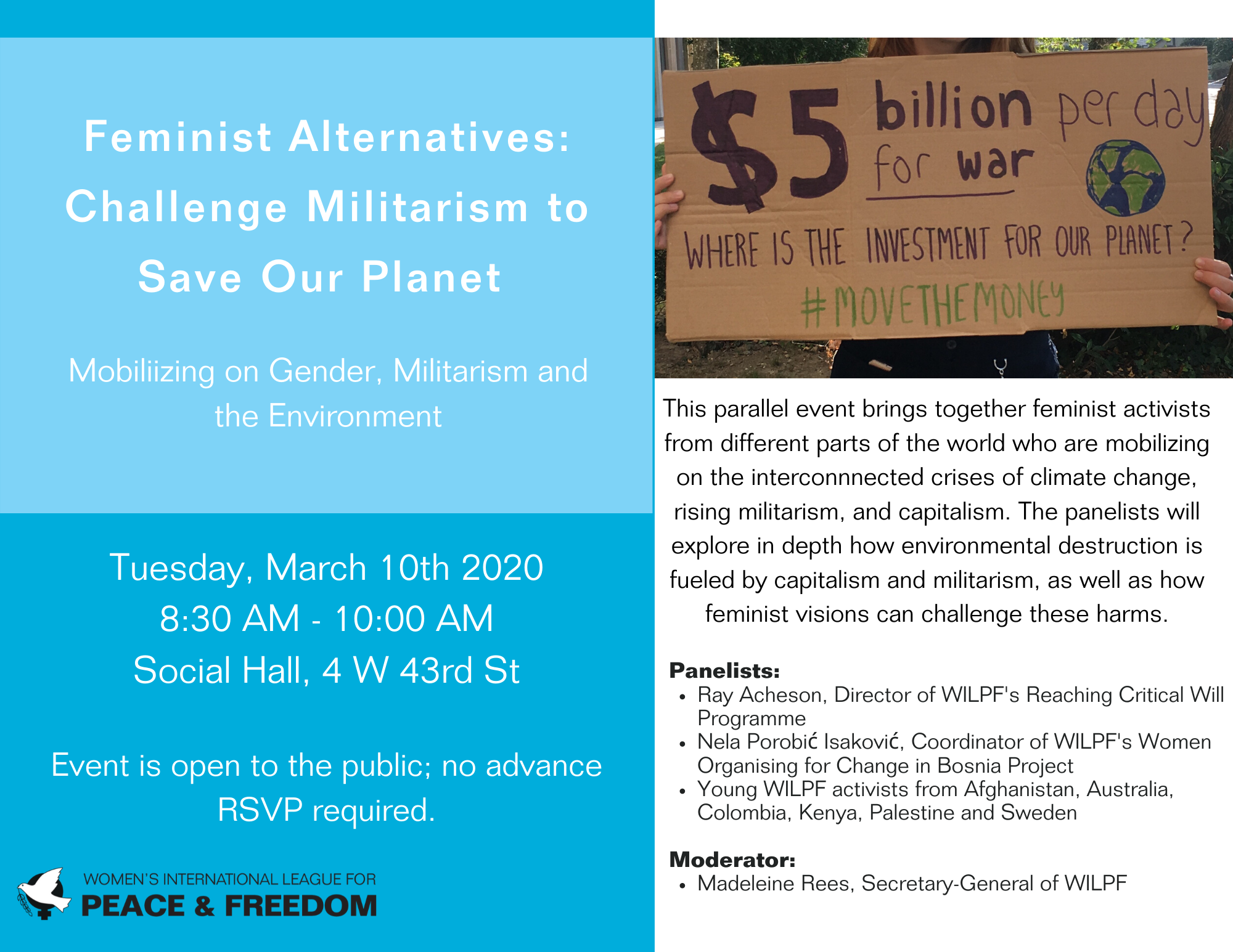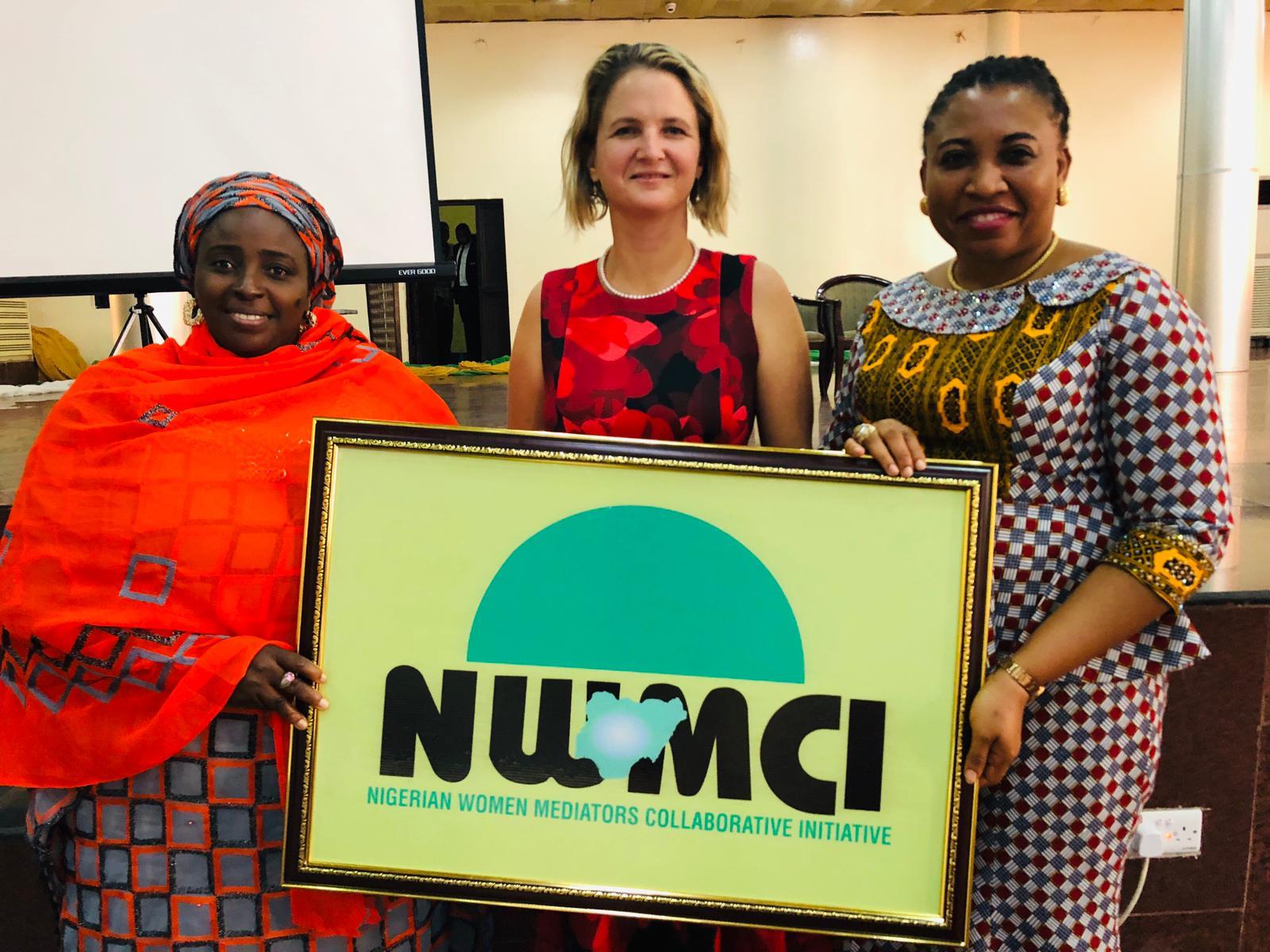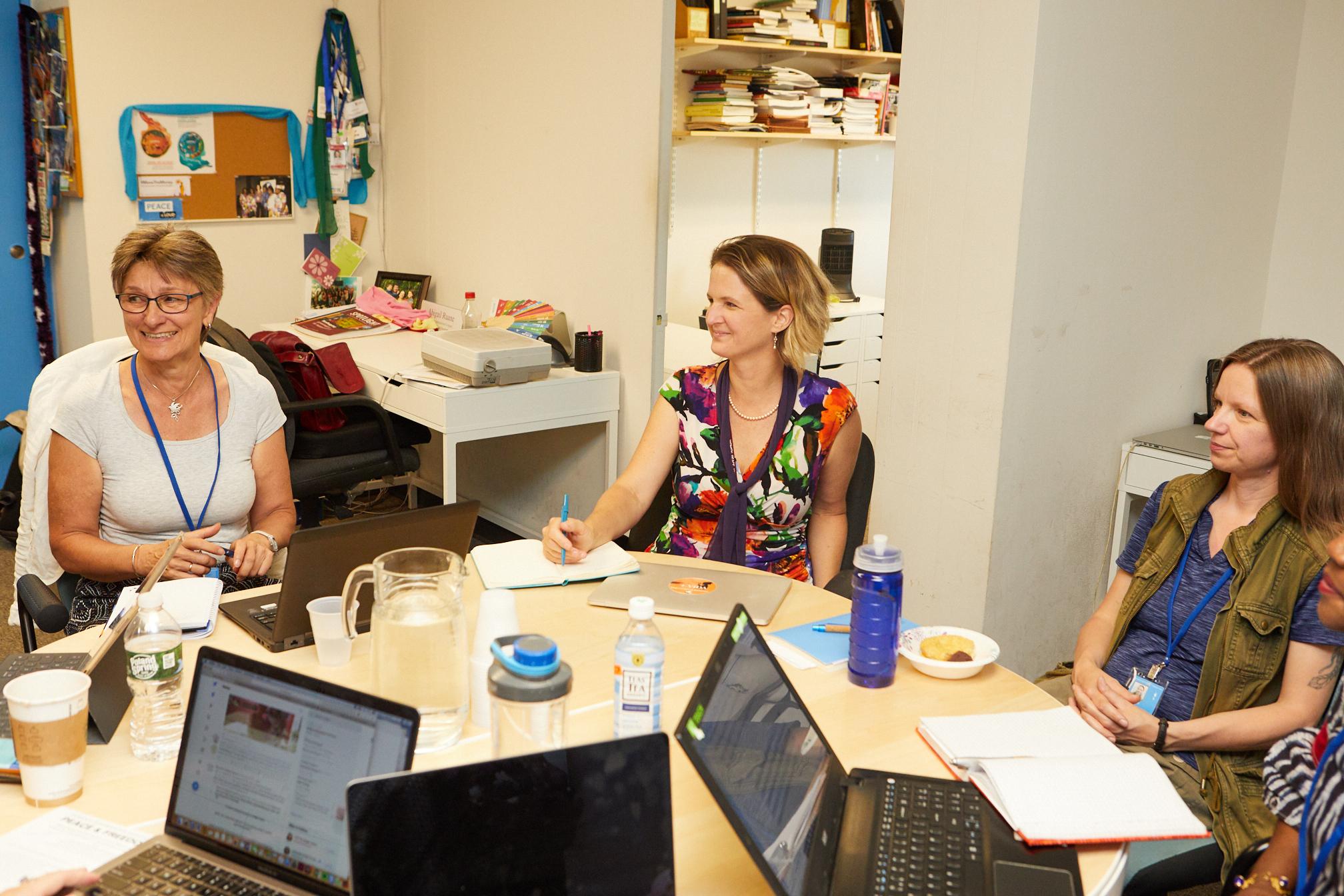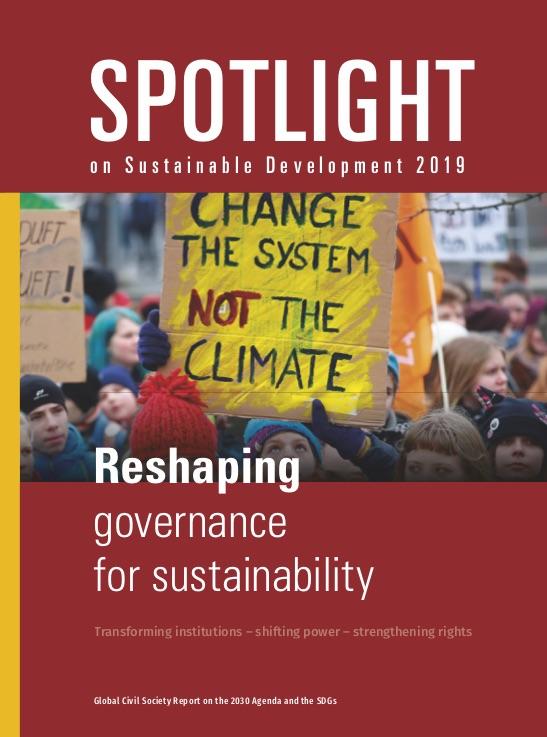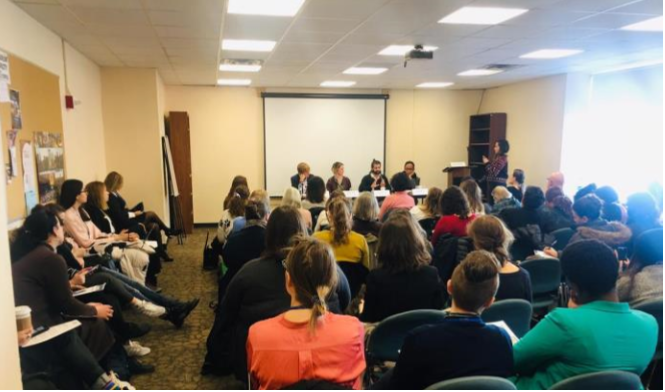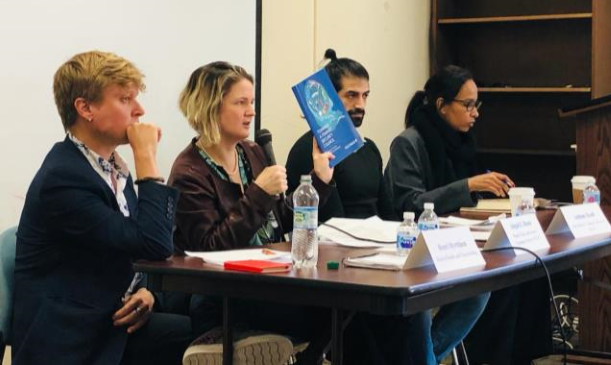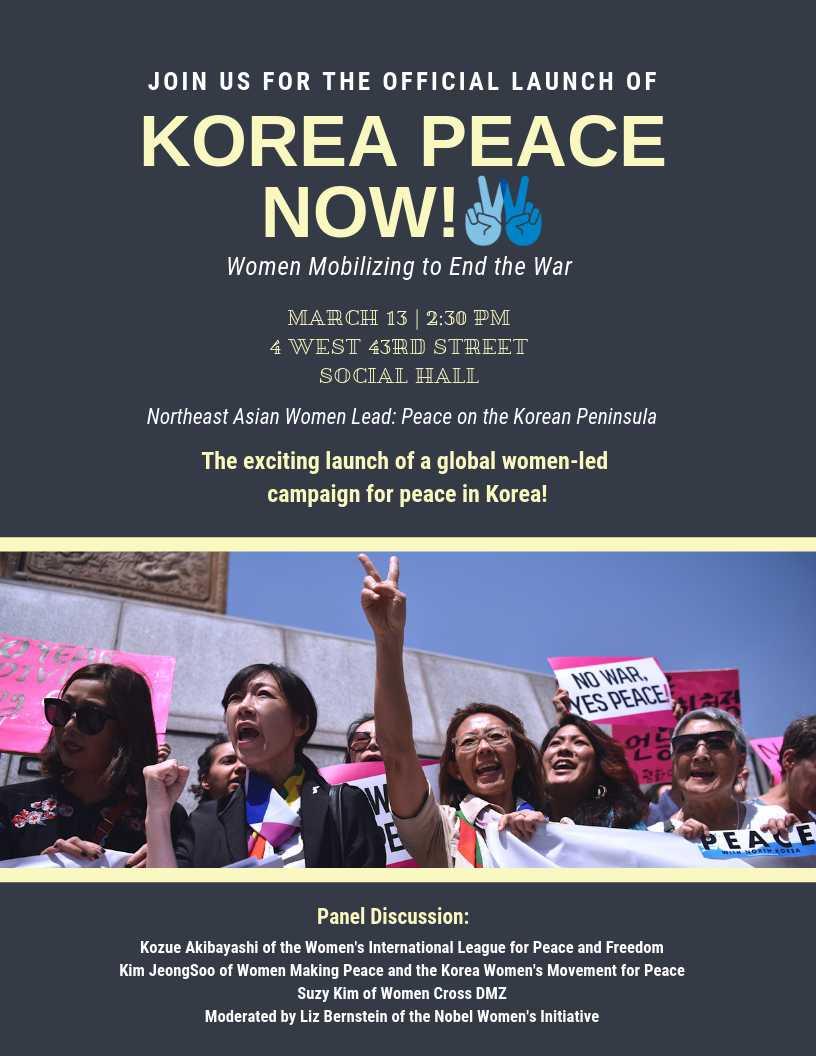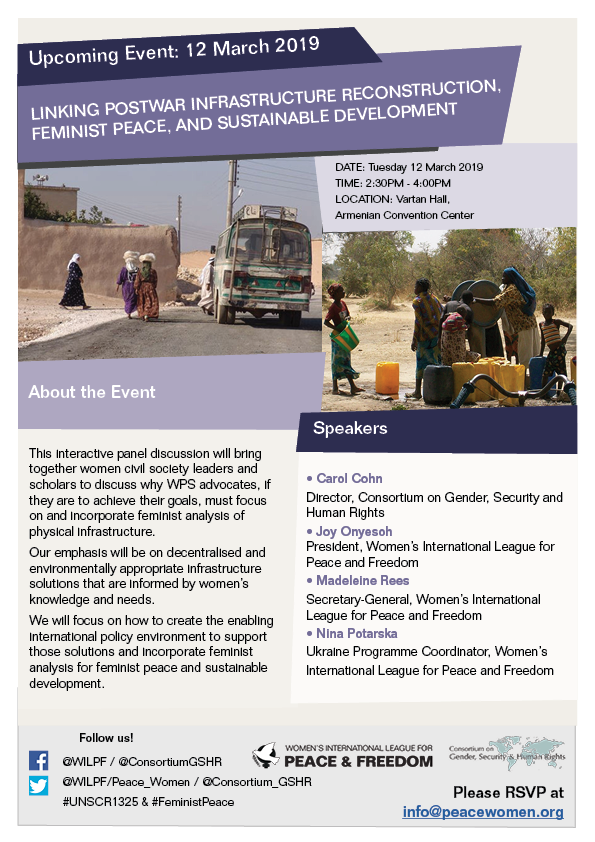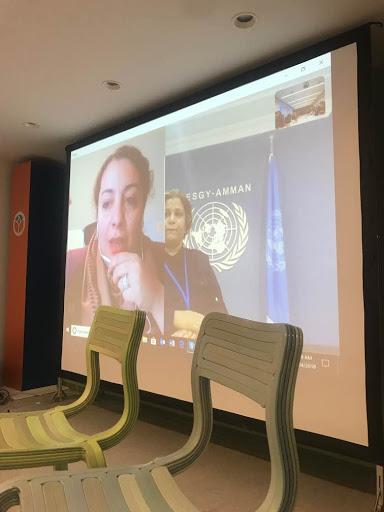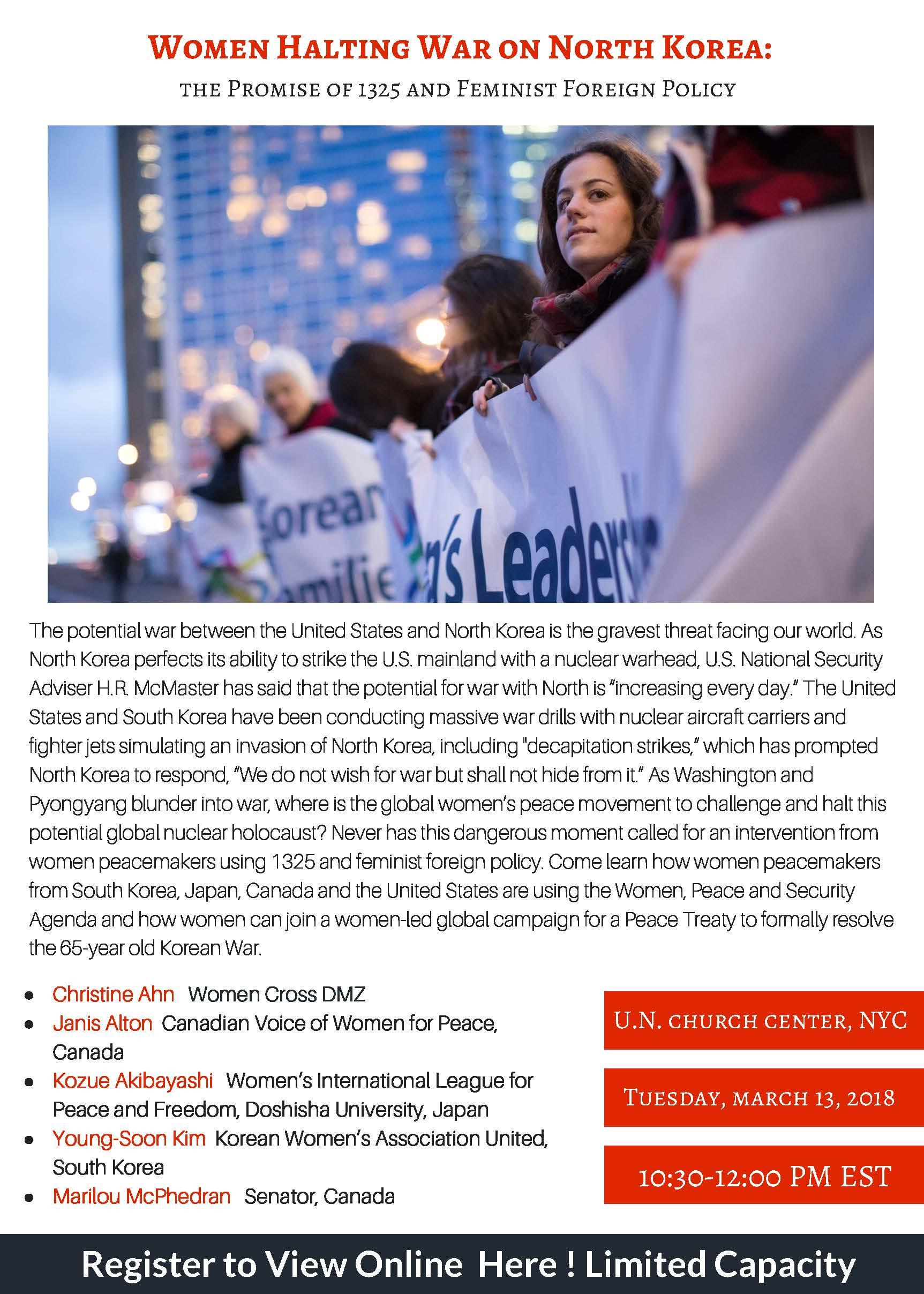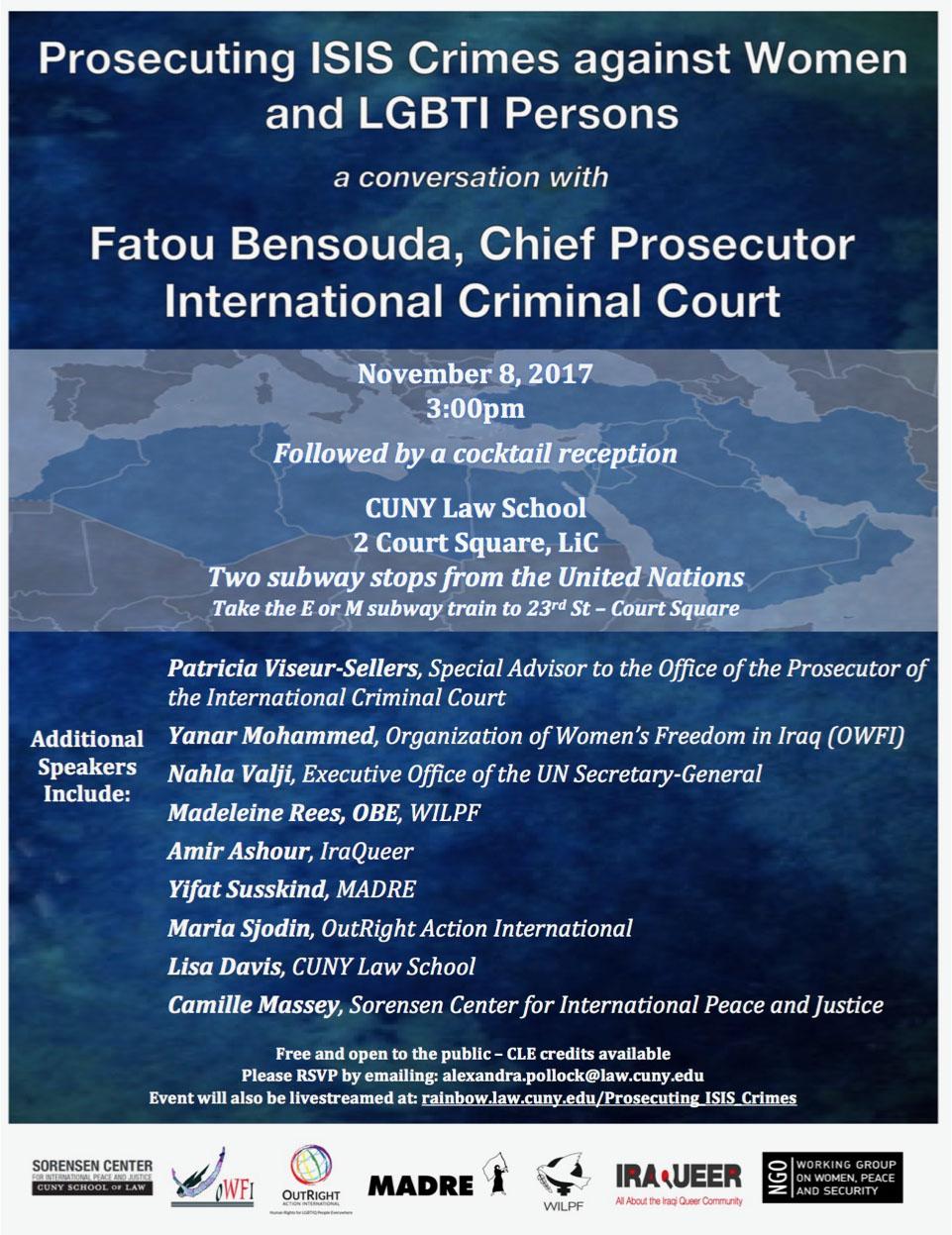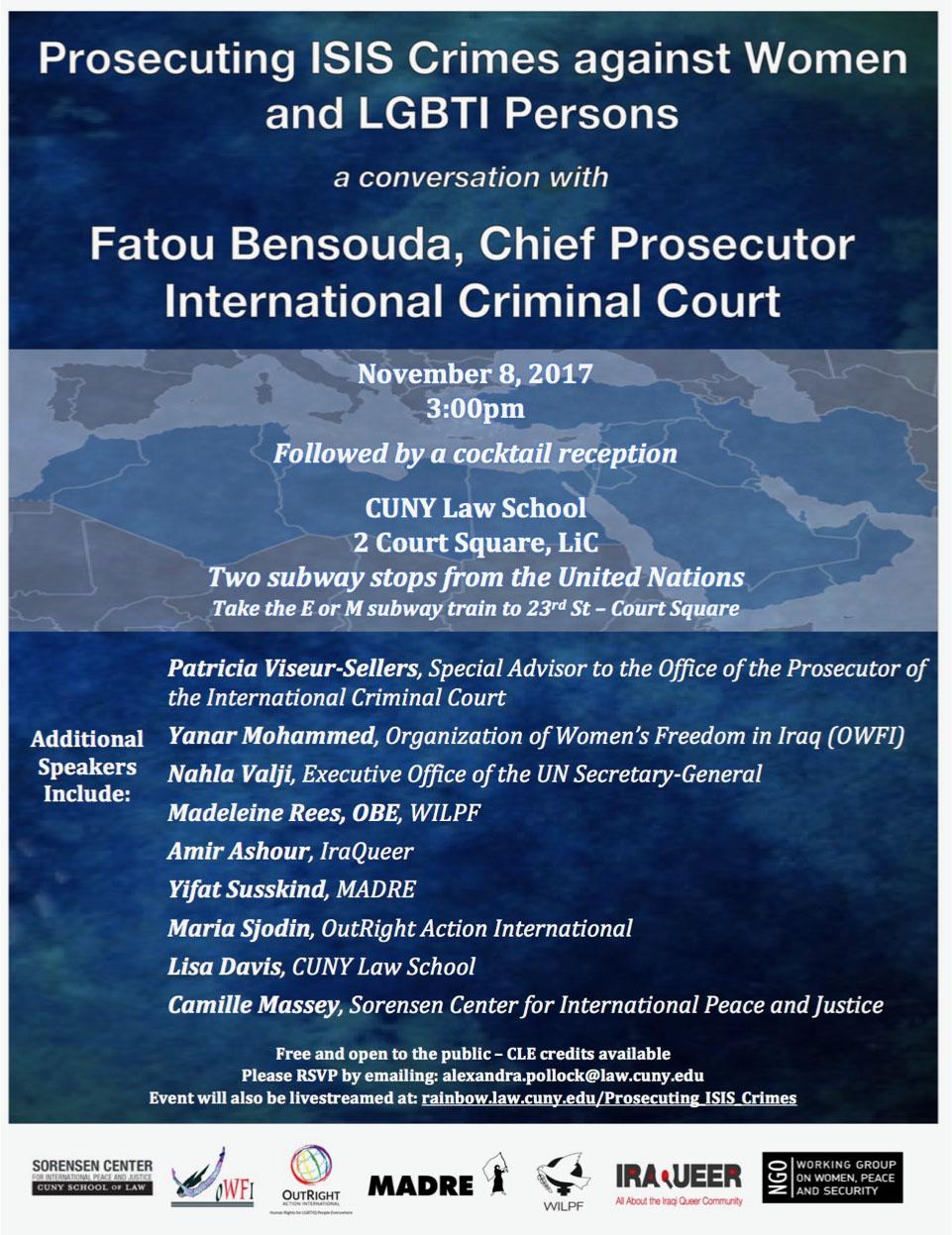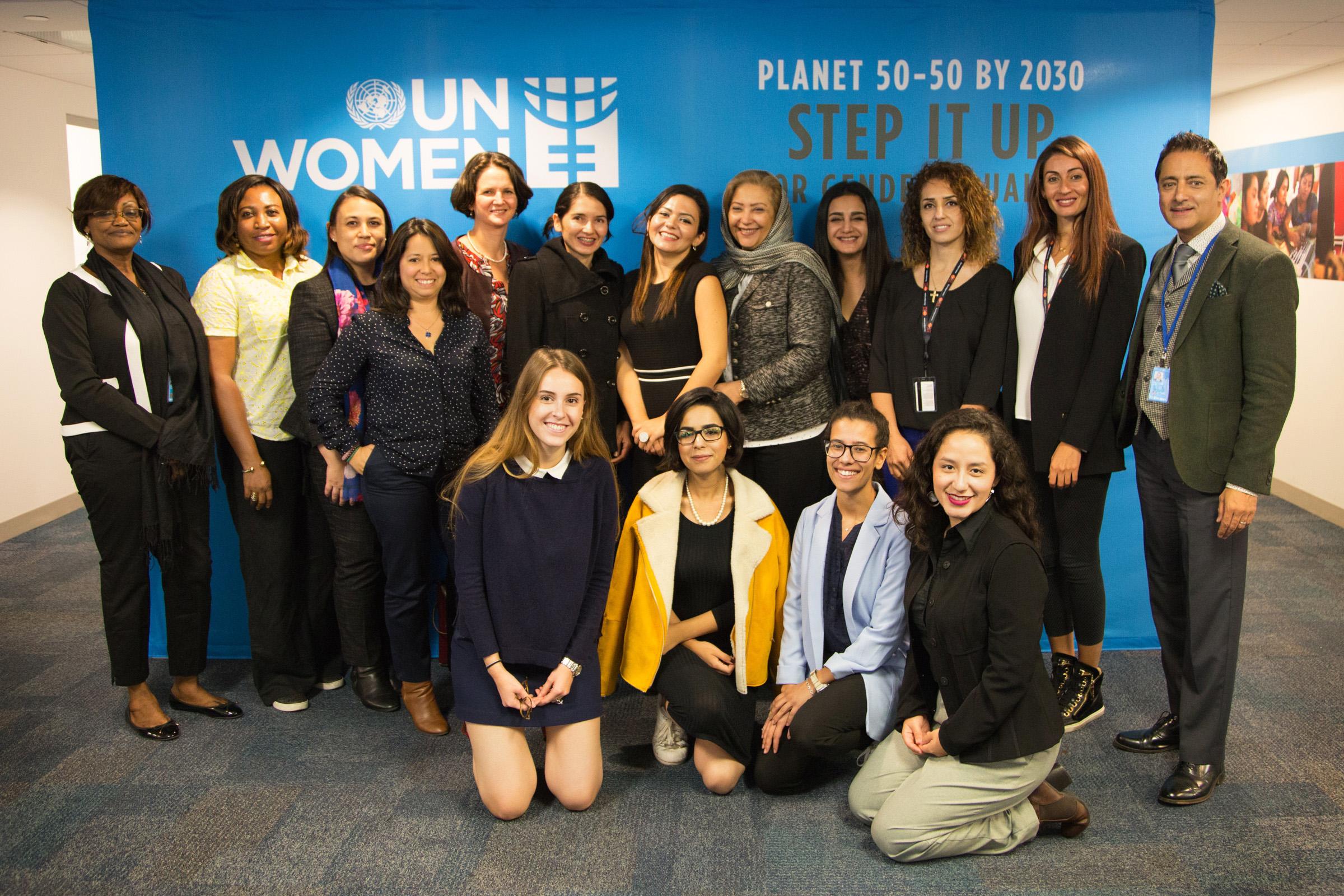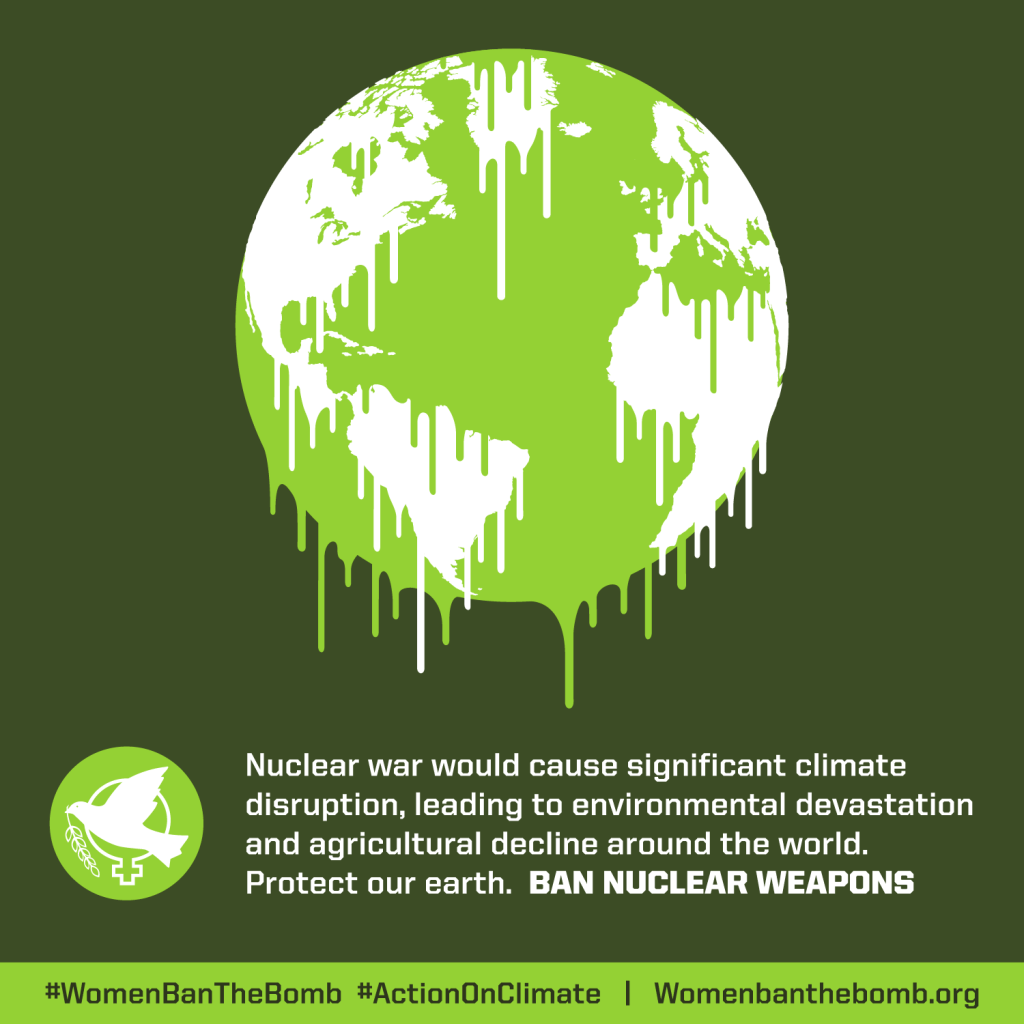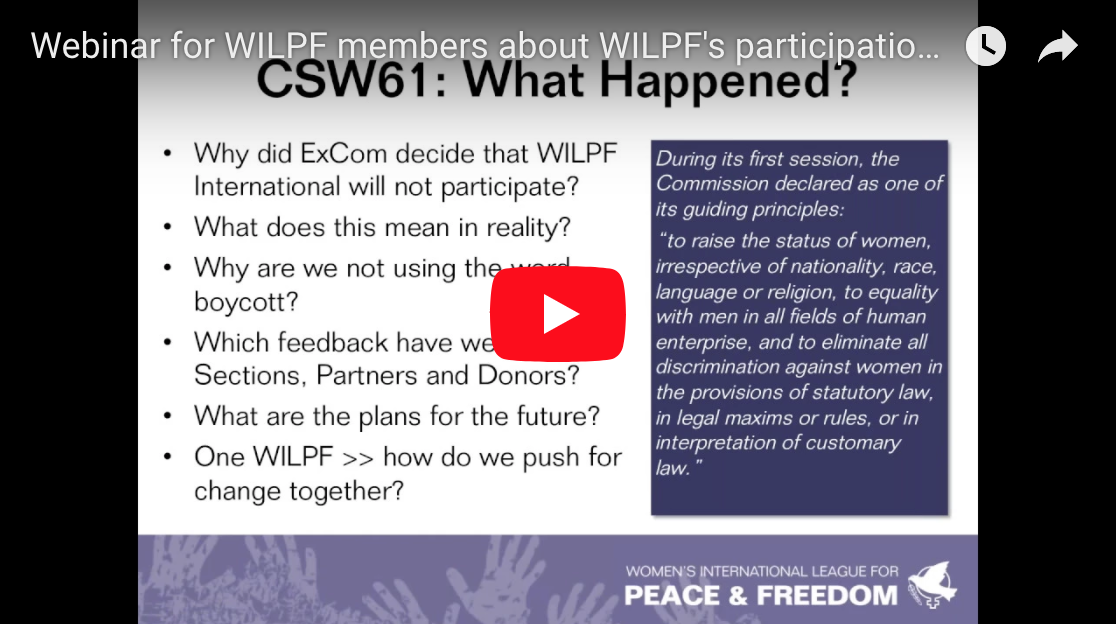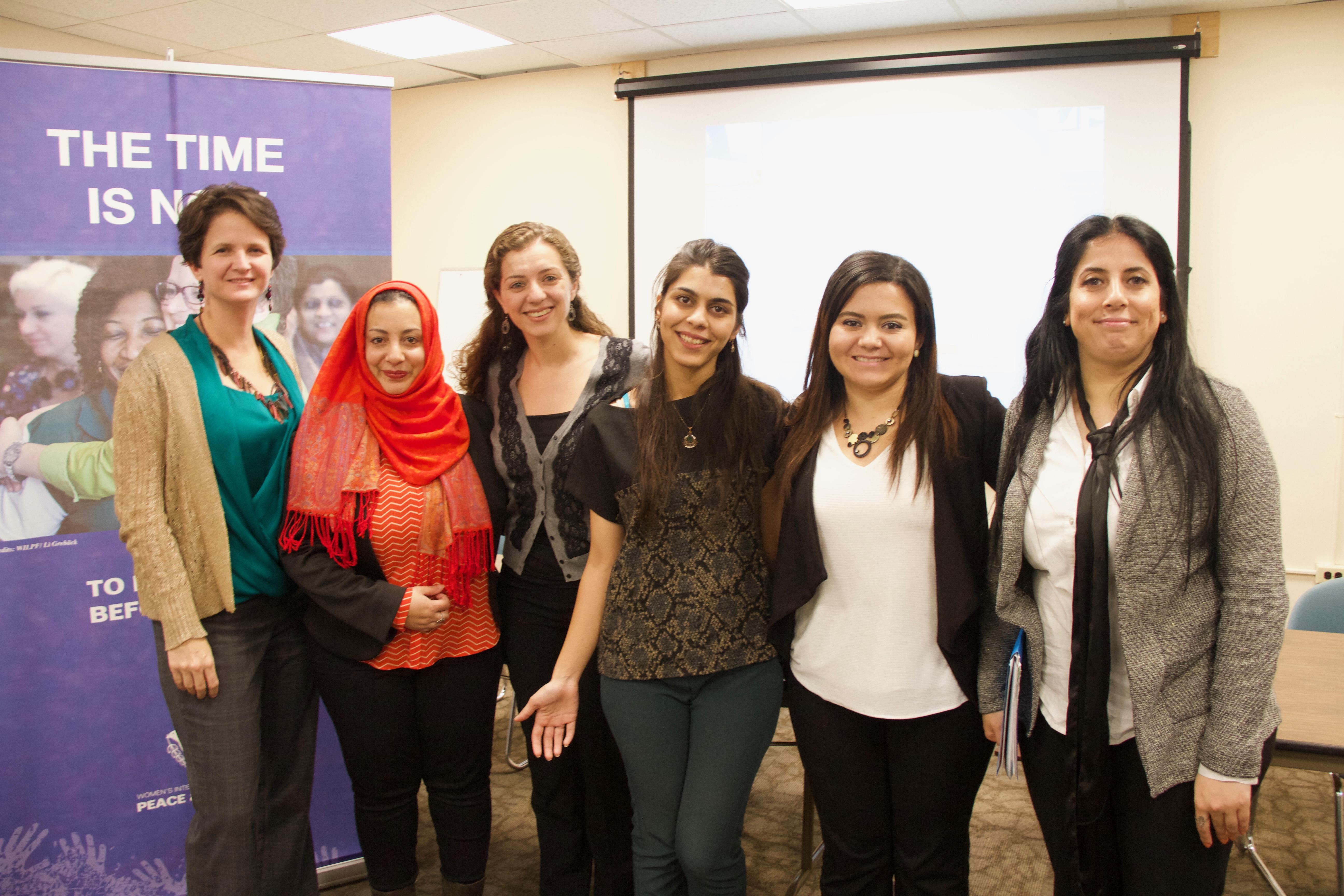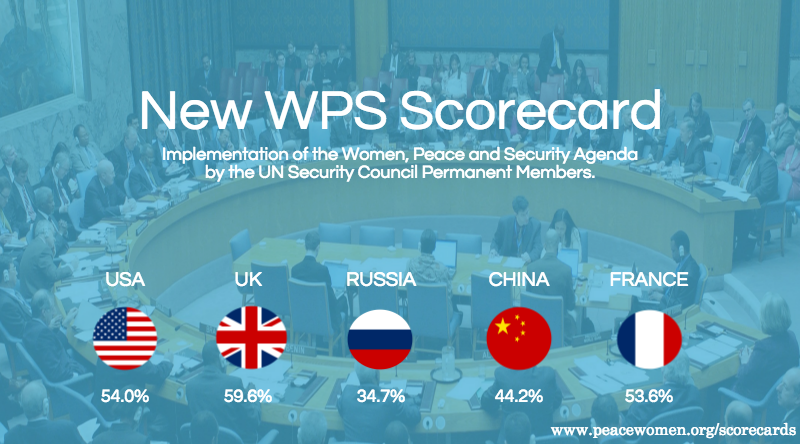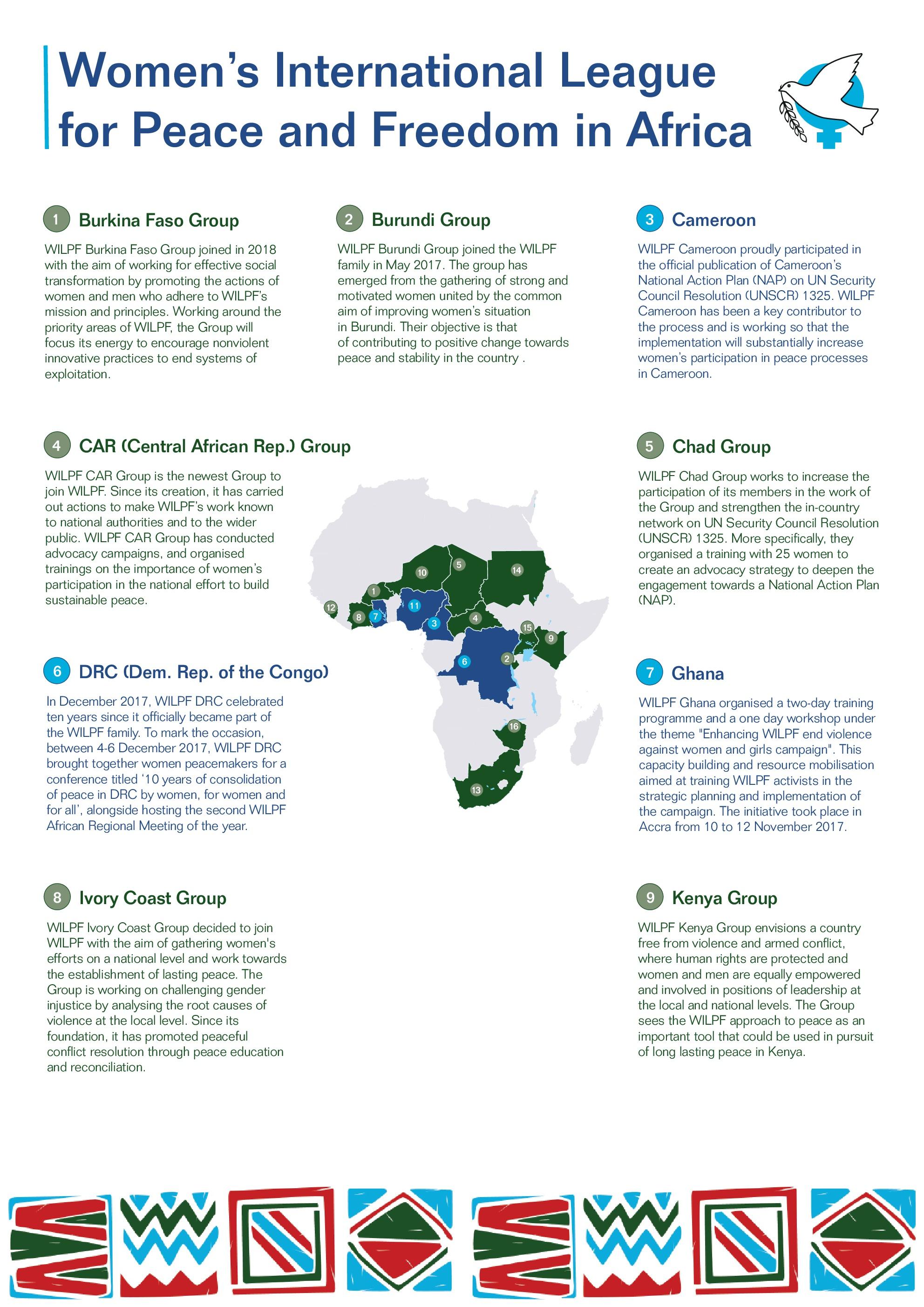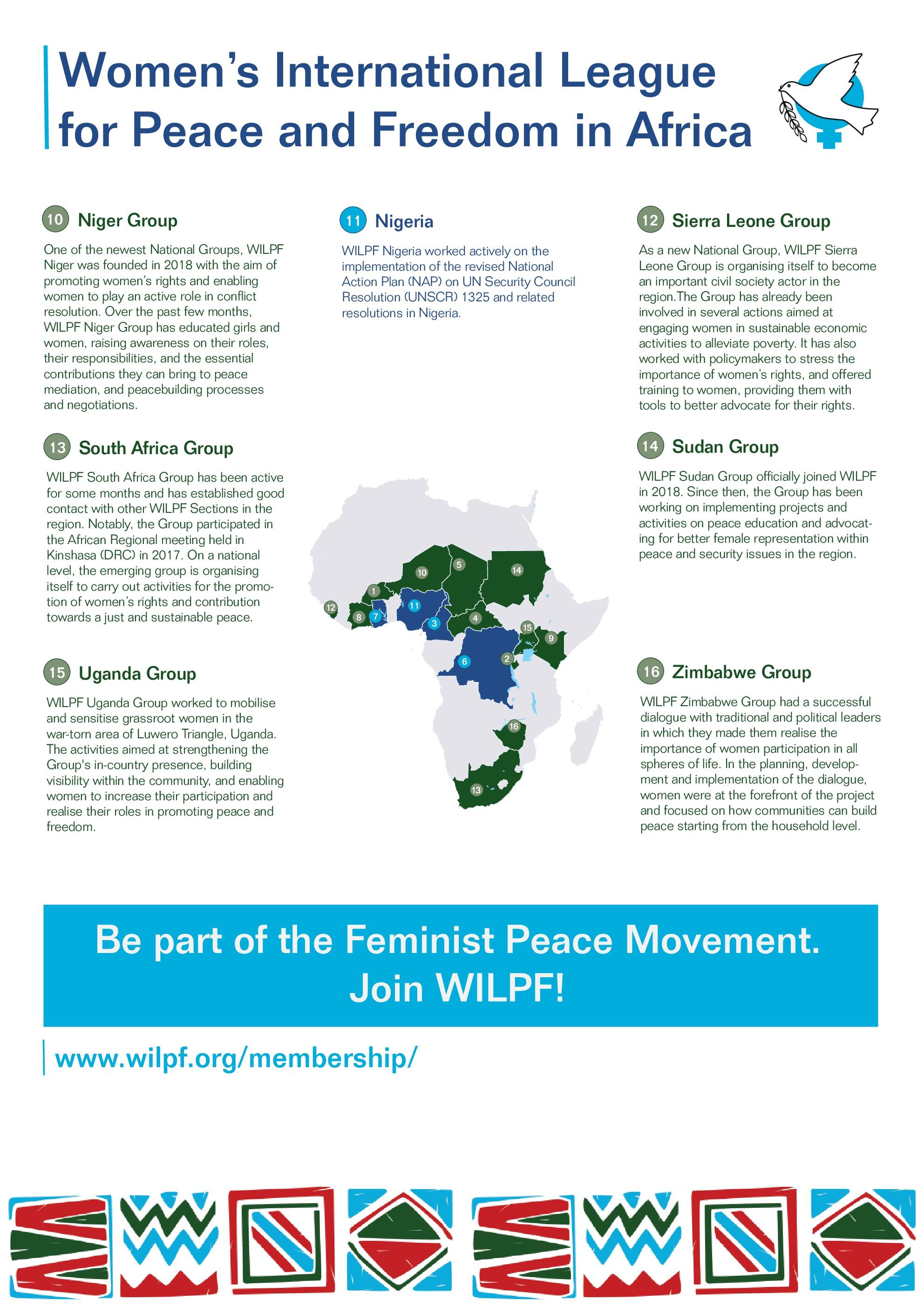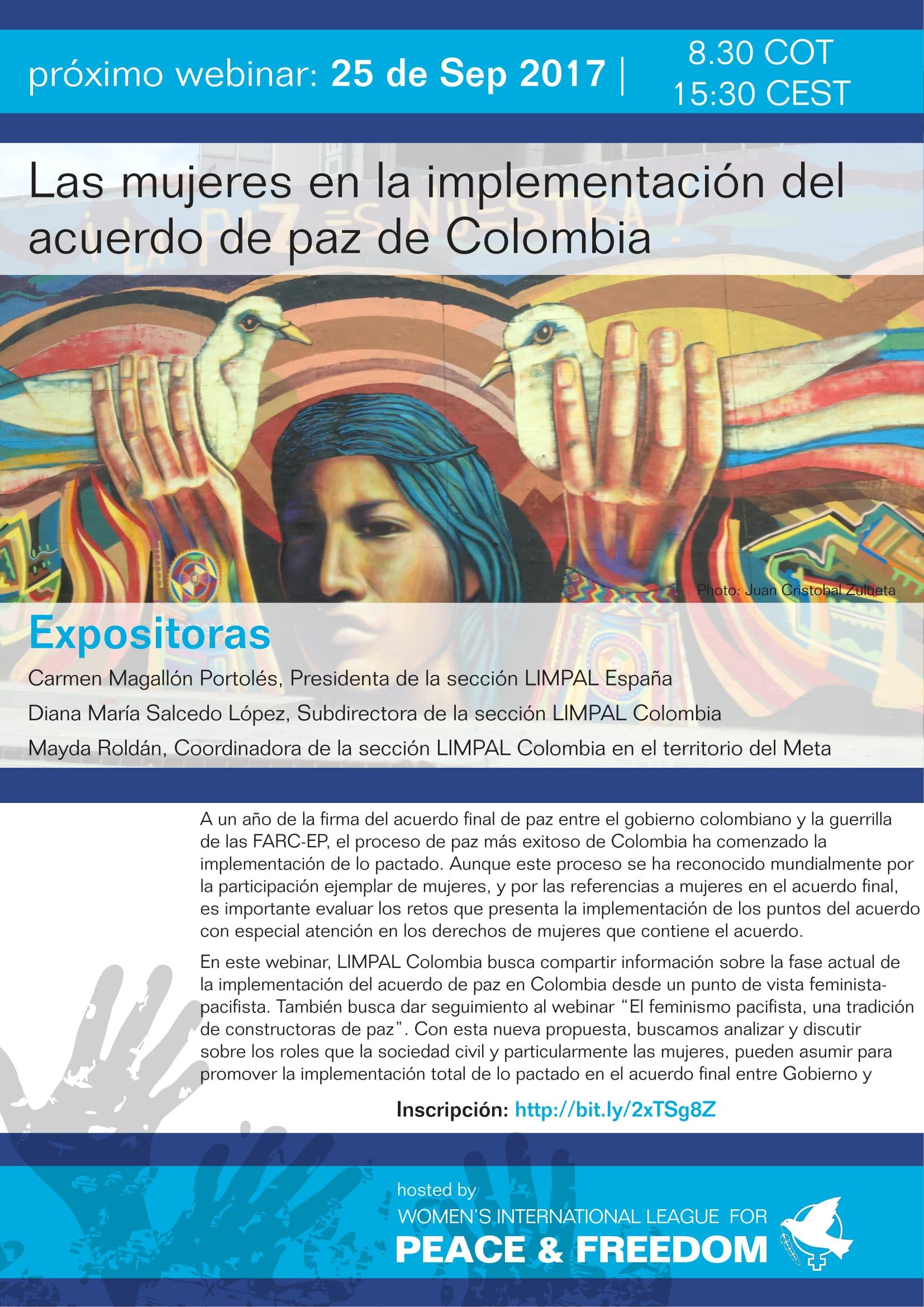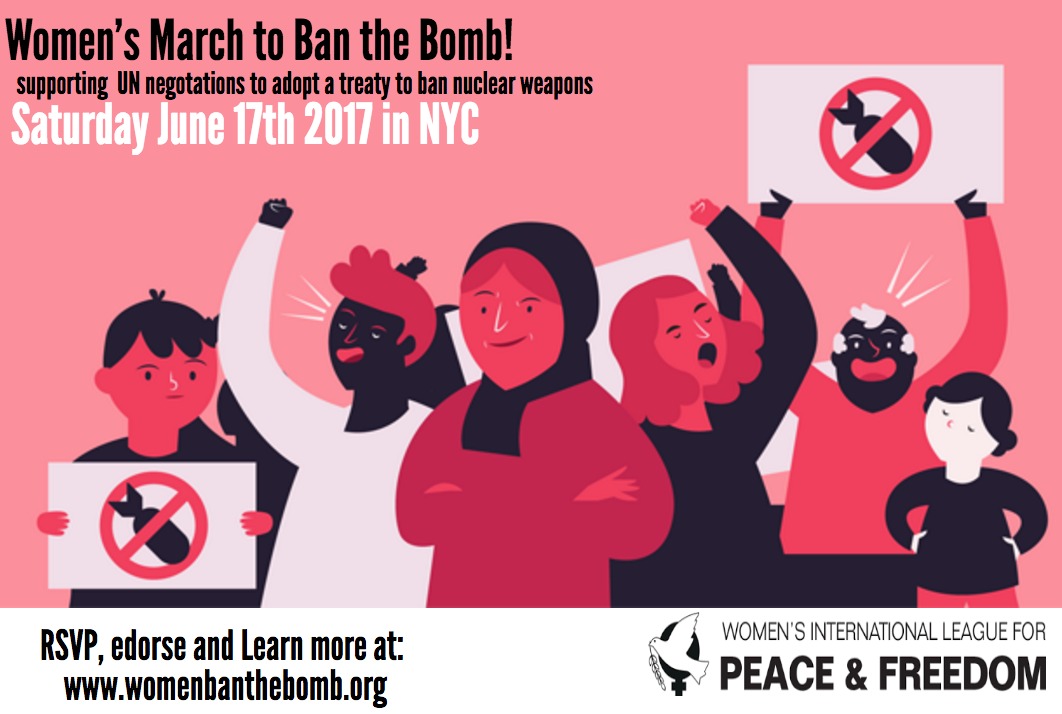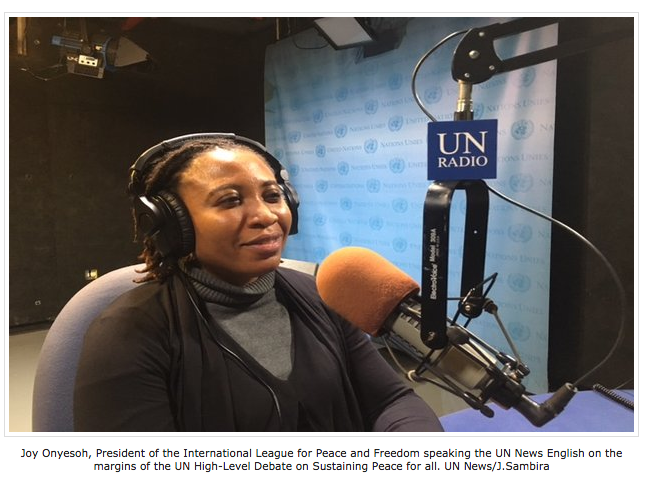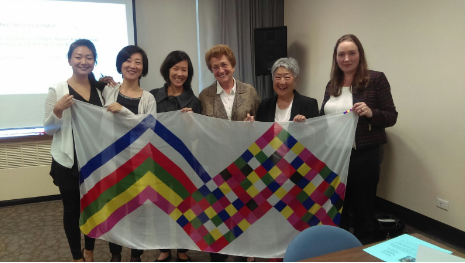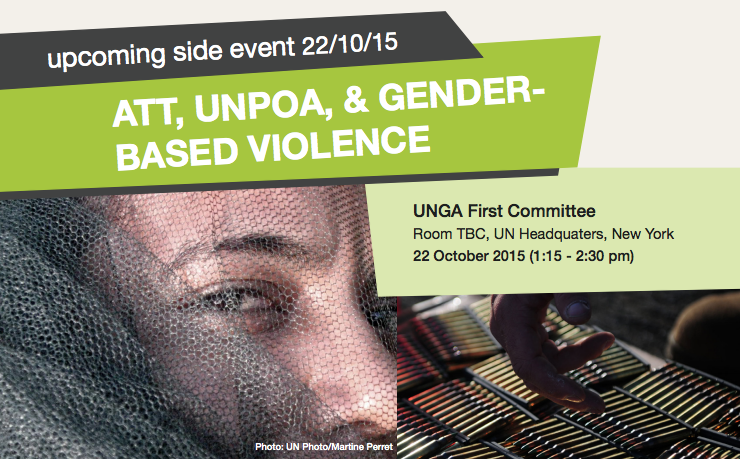On 21 October 2015, WILPF, in collaboration with the Peace Forum organizers (the Global Network of Women Peacebuilders (GNWP), Baha’i International Community, International Peace Bureau, United Methodist Women, the National Council of Negro Women, World Council of Churches, Peace Boat US, World Federation of Methodist and Uniting Church Women, APWAPS, Cordaid, Global Movement for the Culture of Peace, and Urgent Action Fund for Women’s Human Rights) hosted “Voices from the Field: Prelude to the Peace Forum” at the Church Centre of the United Nations.
WILPF WPS Programme's Director, Abigail Ruane, facilitated the event with approximately 150 participants joined from over 40 countries worldwide. Speakers included: Jasmin Galace (Women Engaged in Action on 1325, Philippines), Solange Lwashiga (Caucus des Femms pour la Paix, DRC), Paivi Kanisto (UN Women), Danielle Goldberg (Global Network of Women Peacebuidlers), Youssef Mahmoud (International Peace Institute), and Sharon Bhagwan Rolls (FemLINK Pacific), as well as conversation circle facilitators from Morocco, Cameroon, Georgia, Iraq, Spain, India, and the Netherlands. The event created space for civil society to mobilise around recommendations from the UNSCR 1325 (2000) global study and build momentum to strengthen action by civil society, the UN, governments, and other key stakeholders for effective implementation of the Women, Peace and Security Agenda.
“How can we better strategize? How can we better mobilize?” With these two questions, WILPF PeaceWomen’s Abigail Ruane launched the event, affirming the importance of mobilizing beyond anniversaries. The event then proceeded in two parts. First, a panel of speakers provided an overview of where we are and what we have learned at this 15th anniversary of the Women, Peace and Security Agenda. Second, participants broke out into conversation circles to explore insider and outsider strategies on key priority areas for change. Finally, the event concluded with report-backs from the conversation circles, discussion of next steps, and sharing of commitments and calls for action.
15 Years of UNSCR 1325 (2000)
After welcoming and discussion of the purpose of the event, women human rights defenders and peace activists shared stories about how they have overcome to inspire group action. Solange Lwashiga (Caucus des Femms pour la Paix) shared about her experience with the campaign, “Rien Sans les Femme” (Nothing Without Women), which successfully mobilised over 50 civil society organisations to change discriminatory electoral laws and establish a quota of 50% of women for parliamentary candidates in the Democratic Republic of the Congo (DRC). “Everybody has a responsibility”, stated Lwashiga. “Whoever you are, wherever you are, you have got a responsibility”. Afterwards, Jasmin Galace (Women Engaged in Action on 1325) shared her experience from the Philippines in advocating for investment in women’s rights and peace education and successfully mobilising for the 2013 Arms Trade Treaty (ATT). She brought attention to women’s innovation, education, and dialogue as critical for peace, especially when faced by a world such as before the ATT where bananas were more regulated than arms.
UN Women Chief of Peace and Security Päivi Kannisto reflected on the previous week’s 15th annual Security Council debate on Women, Peace and Security and launch of the UNSCR 1325 (2000) global study. She highlighted the gains made by UNSCR 2242 (2015), which clearly links women’s participation and durable and sustainable peace, the importance of civil society engagement, and effective financing of the Women, Peace and Security Agenda.
Global Network of Women Peacebuilders’ Danielle Goldberg overviewed the process and findings of the civil society survey, led by GNWP in coordination with Cortaid, ICAN, and the NGO Working Group on Women, Peace and Security. The survey compiled 317 responses from 71 countries including 17 focus group discussions using a holistic, collaborative, innovative and local approach. On average, it found that participants rated the effectiveness of the Women, Peace and Security Agenda as 3.3 on a 6-point scale. It found civil society’s top priority to be a strengthened meaningful participation of women in peace processes to move beyond numbers for impact. Other priorities included strengthening prevention of armed conflict through strengthened financing for girl’s education, women’s livelihood, land rights, and the broader Women, Peace and Security Agenda; addressing root causes of conflict, and building accountability for crimes and violation of women’s rights and gender-based violence.
International Peace Institute’s Mr. Youssef Mahmoud reminded participants of the need to engage men in implementing the Women, Peace and Security Agenda. Building on his experience as a member of the review boards of all three peace reviews this year (on Peace Operations, Peacebuilding, and Women, Peace and Security), Mahmoud recommended that moving forward on effective implementation requires strengthened action for an integrated approach across the UN system to 1) prevent conflict (a key gap area) and promote sustainable peace, 2) speak to truth to power and more effectively engage men and governments for taking action, and 3) localise peace. “This is not a women’s issue”, he stated, “it is a whole society effort for sustainable peace”.
Finally, FemLINK Pacific’s Sharon Bhagwan Rolls shared opportunities for connecting local to global action from her experience in Fiji and on the Women, Peace and Security High-Level Advisory Group. She shared information from civil society strategy discussions the previous week, which bring attention to “the human rights in our security, not the security of our peace.” Bhagwan Rolls also emphasised the importance of engaging with young women around community issues (such as access to water) and strengthening engagement with regional organisations and media including community radio.
After a panel discussion to provide context, participants broke out into conversation circles on key priority areas to discuss inside and outside strategies for creating change, outline civil society commitments, and share calls to action on priority areas. Discussions centred around the following priority areas: 1) holistic Women, Peace and Security Agenda, 2) strengthen action for preventing violence and addressing militarism, 3) ensure women’s participation, 4) prevent violent extremism, 5) finance gender equality, 6) engage men and boys and address patriarchal institutions, and 7) create outside strategies for change.
Build a holistic agenda
At the conversation circle on building a holistic agenda facilitated by Fatima Outaleb (Union de l'action feminine, Morocco), participants explored what a holistic agenda means and strategies for strengthening this moving forward. Peace, gender, participation and human rights agendas involve different definitions whose diversity needs to be addressed for a rich understanding of gender equality, peace, and human security. They also bring different tools to bear, such as CEDAW, the Beijing Platform, and the Women, Peace and Security Agenda. According to one participant, “There is a confusion about what this Agenda is. My government thinks this Agenda is just bettering the lives of the women on the ground, but that’s a limited Agenda.” According to another, “the overall goal is to bring peace and security across the world.” Participants committed to mobilising across movements for a transformative agenda that links local to global and across issue areas to prevent all forms of violence and conflict. They called for strengthened investment in community structures which secure the rights of all people, and which prioritise those most at risk due to gender, race, ethnicity, class, sexual orientation and gender identity, nationality, age, ability, or other identification; they emphasised the importance of concrete action to strengthen effective and gender equitable political participation, economic empowerment, and access to justice and comprehensive legal, health, and social services and build women and men’s power to work together for nonviolent social change.
Strengthen action to prevent violence and address militarism
At the conversation circle on strengthening action to prevent violence and address militarism, facilitated by Sylvie Ndongmo (WILPF-Cameroon), participants drew attention to the need to strengthen action on prevention as a key gap area by redirecting priorities and creating innovative strategies build political economies of peace rather than political economies of war. It is critical to clearly identify what demilitarisation means and how it impacts people’s lives. Creeping militarism has widespread effects, including shrinking space for civil society, militarised counter-terrorism measures, and criminalisation and repression of human rights defenders. Activists committed to taking strategic action including to: document the impact of arms on gender-based violence, identify countries who facilitate flow of arms, advocate for strengthened education on women’s rights and peace education into curriculums, identify female policyholders to represent local women, creating links between women at national and international levels, and, facilitate access of women’s movements to information. Participants called for governments to implement the global study recommendations especially around scaling down war infrastructure and scaling up peace infrastructure by reducing military spending, taking action on demilitarisation more broadly, and increasing awareness and investment in women’s human rights including through dedicated civil society funding, fully financed gender equality architecture and UNSCR 1325 (2000) National Action Plans, and scaled up investment gender equitable sustainable development and peace. They also committed to engaging non-traditional stakeholders including by building alliances with media houses, educational institutions, and other communications hubs to recognise women not as victims but as powerful agents of change and to strengthen awareness of the obstacles that need to be overcome to create sustainable peace.
Ensure participation
At the conversation circle on ensuring women’s meaningful participation facilitated by Elene Rusetskaia (Women’s Information Centre, Georgia), participants strategised on how to strengthen complementary roles of government and civil society to ensure women’s meaningful participation and action on women’s rights. Meaningful rather than token participation is critical. As one participant noted, “we signed the peace agreement in Bosnia 20 years ago, and we agreed to create space for women in [an] election role. Women now represent 17-20% of the Bosnian parliamentary, but the men don’t want women to be strong.” As another participant stated, there must also be “accountability for women in positions of leadership” to ensure substantive inclusion. Participants called for governments to be held accountable to respect the legal political framework and implement laws in a way that ensures women’s equal participation and rights, including through quota systems, both in politics and peace negotiations. Democratic governance requires action before, during, and after the conflict to: ensure women civil society are meaningfully included at formal peace tables; recognise informal and local peacemakers as builders of peace, and only recognise peace agreements with women’s full and meaningful participation and rights. Civil society must have strengthened support so as to continue to be able to build capacity for women’s participation and rights such as through trainings, workshops for women leaders, advocacy, and outreach, including for young women and across the lifespan. They also called for action to eliminate obstacles to the peace work of women's human rights defenders and peace activists including through repeal of laws that criminalise and restrict women human rights defenders and curtail civil society space, and through investment in political, technical, and financial support for feminist movement building.
Prevent Violent Extremism
At the conversation circle on preventing violent extremism facilitated by Suzan Aref (Women Empowerment Organisation, Iraq), participants explored violent extremism as one part of a spectrum of violence and strategised about how to strengthen action to prevent it holistically for more effective impact. Participants brought attention to how discussions of violent extremism focus too much on a few particular groups, such as ISIS. As one participant noted, “women are over 50% of the population, yet we are still mostly seen as silent victims of the conflict.” This means discussions fail to recognise other groups engaged in violent conflict (such as states). It is critical to strengthening outreach with the media to address these limited conceptions and bring attention to how current us-them framing supports Islamophobia and militarised responses, while also providing alternatives based on non-violence, gender equality, and peace. It is also critical to recognise and strengthen women’s on-going work for peace. As one participant noted, strategies are needed on “how to legitimize women as agents of action.” The group called for governments strengthen international and national action on human rights and humanitarian law including on CEDAW and the Rome Statute, and to work with women’s movements to ensure any action taken on violent extremism does not further put at risk or marginalise communities. Participants committed to leveraging international commitments for accountability, building collaboration with media, and continuing to take action to overturn obstacles to women’s local leadership across movements for peace and gender justice.
Finance Gender Equality
At the conversation circle on financing gender equality, facilitated by Maria Villellas Ariño (WILPF-Spain), participants explored formal and informal obstacles to gender financing and strategised on how to use innovative approaches to strengthen sustainable and on-going investment in gender equality and peace. Given that currently only 2% of development funding on peace and security is allocated to gender equality, raising the bar and creating non-traditional approaches and sources of financing is critical. Participants highlighted the need to strengthen traditional financing mechanisms including by fully financing UNSCR 1325 (2000) National Action Plans and spinning up support in the Global Acceleration Instrument. They also highlighted the need to strengthen non-traditional financing sources, including by reducing military spending in line with the Beijing Platform for Action and Agenda 21, reallocate to gender-equitable social development (i.e. through the Sustainable Development Goals on peace [goal 16] and gender equality [goal 5]). As one participant stated, “All programmes must be resourced from a human rights direction.” Participants committed to building coalitions, including among women’s rights, disarmament, and women’s peace and security activists, and leverage local elections and other political spaces for raising awareness and strengthening support on gender financing and action.
Engaging Men and Boys and Addressing Patriarchal Institutions
At the conversation circle on engaging men and boys and addressing patriarchal institutions, facilitated by Anand Pawar (SANAM: South Asian Network to Address Masculinities, India), participants discussed some of the tensions between engaging men, on one hand, and addressing patriarchal institutions, on the other; they also explored strategies for overcoming personal to political obstacles for sustainable peace. As one participant noted, “the Women, Peace and Security Agenda is preaching to the converted.” Engaging non-traditional stakeholders and power holders including men is therefore critical for effective change. However, engaging men without addressing patriarchal systems of power is not enough. As another participant stated, “It is only by men and women working together that makes peace in communities attainable.” Engaging men must be done from this perspective so as to overcome obstacles to equality and transform society for justice and peace. This requires a two-part approach: first, it requires sensitising men, such as through games and gender awareness raising in boys clubs; second, it requires connecting the personal to the political and highlighting how violent masculinities support violence from the personal such as through domestic abuse and battering to the international level through militarism and war. Participants committed to creating spaces for men as well as women to engage men and boys in our families, communities, and world to recognise and take action to transform gendered structures of power and privilege for non-violence, gender justice, and peace. They called for action to build the capacity of masculine leaders for gender-responsive analysis and action including through training, incentives, and accountability measures to ensure the development and implementation of policies and programmes that ensure women’s full and equal participation and rights. They also called for action to build political will and accountability for international financial institutions, transnational corporations (including private military corporations), religious institutions, and other patriarchal institutions to be held accountable for upholding women’s full and equal rights
Outside strategies for change
At the conversation circle on outside strategies for change, facilitated by Paula Banerjee (University of Calcutta, India) and Isabelle Geuskens (Women Peacemakers Programme, Netherlands), participants explored how to use creative and non-traditional tactics and strategies from an outside perspective to create change. Participants defined inside and outside strategies based on positioning relative to established institutions. “Insiders are the establishment; the government; the UN; the corporate media,” said one participant. “Outside is an unsafe space. When it is an unsafe space, you have a different perspective. You’re looking for a change”. Participants explored how activists have used outside spaces to challenge comfort zones, such as the women from Liberia who stripped naked to demand peace. Participants highlighted the risks associated with outside strategies and the importance of finding allies, building solidarity, and learning between movements to strengthen good practice in creating change and addressing insecurities and risks. They committed to strengthening collaboration to build outside strategies as complementary to inside strategies for change, and to bridging bridges across movements for solidarity to prevent violence and promote active non-violence, feminist foreign policy, gender justice, and peace. They also called for more traditional stakeholders to strengthen investment and political support for building knowledge, capacity, skills, and trust with grassroots activists and community actors to build solidarity and provide better tools for strategizing and mobilising.
Call to Action
The event concluded with report-backs from the conversation circles, discussion of next steps, and sharing of commitments and calls for action.

